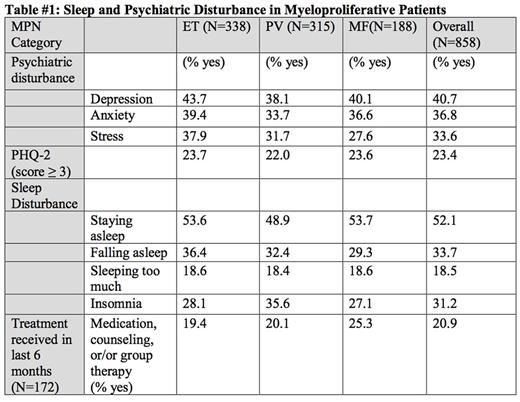Abstract
Background:
Patients afflicted with Philadelphia negative myeloproliferative neoplasms (MPNs) experience profound symptom burden including fatigue, early satiety, night sweats, bone pain, microvascular sequelae, etc. Prior studies reveal sleep and psychiatric disturbances are also common in MPN patients however more data is needed regarding the type of disturbances experienced, prevalence, and modalities utilized to address them.
Methods:
Patients were recruited internationally via social media. Informed consent and online self-report surveys (Qualtrics) were completed capturing patient demographics, disease specific data, patient health questionnaire (PHQ-2) depression assessment, type of sleep and psychiatric disturbances via patient self-report, and modalities used to address them.
Results:
Patients : A total of1087 patient surveys were consented. Of these, 858 had 10 or more responses. There were 338 essential thrombocytosis (ET), 188 myelofibrosis (MF), 315 polycythemia vera (PV), and 17 other. Mean age of participant was 58.2 years. The most common countries represented included United States (55.1%), United Kingdom (26.9%), Australia (3.2%), and Germany (3.0%), with 48 countries in total participating. Participants were 77.5% female.
Psychiatric Disturbance: Overall depression was reported in 327 patients (40.7%), anxiety in 295 (36.8%), and stress 264 (33.6%). The PHQ-2 revealed clinically significant depression (% less than or equal to 3) in 23.4% of patients overall.
Sleep Disturbance: Difficulty staying asleep was noted in 447 patients (52.1%), difficult falling asleep in 289 (33.7%), insomnia in 268 (31.2%), and sleeping too much 159 (18.5%).
Treatment: Of those patients receiving mental health treatment in the last 6 months (n=172 overall, 20.9% of total MPN population), 131 patients (81.9%) received medication, 74 patients (52.9%) received counseling, and 6 patients (5.0%) received group therapy. See Table #1.
Conclusion:
Sleep and psychiatric disturbance are prevalent in an internationally and MPN subtype diverse population. Mental health treatment, including medication, counseling, and/or group therapy was received in only 20.9% of the population. This study highlights the prevalence and potential under-treatment of sleep and psychiatric disturbance in those afflicted with MPN. Interestingly, patients self-reported depression more often than revealed by the PHQ-2. More studies are needed to understand optimal screening and treatment strategies in the MPN patient population.
Gowin: Incyte: Membership on an entity's Board of Directors or advisory committees, Speakers Bureau. Mesa: Promedico: Research Funding; Ariad: Consultancy; CTI BioPharma Corp.: Research Funding; Celgene Corporation: Research Funding; Galena Biopharma, Inc.: Consultancy; Gilead Sciences, Inc.: Research Funding; Incyte Corporation: Research Funding; Novartis Pharmaceuticals Corporation: Consultancy.
Author notes
Asterisk with author names denotes non-ASH members.


This feature is available to Subscribers Only
Sign In or Create an Account Close Modal